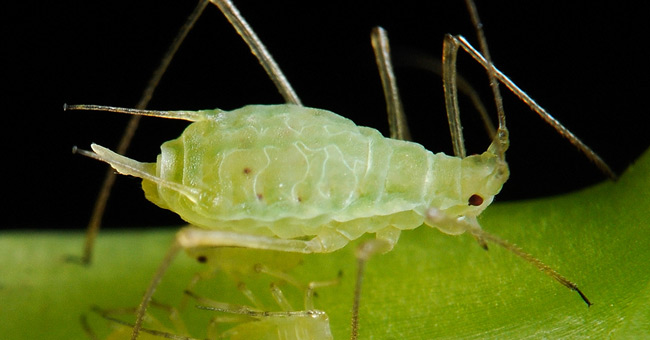Click Here To Join Our Telegram Channel for FREE daily tutorials!
 image – wikipedia (PLoS Biology) lic. under CC 2.5
image – wikipedia (PLoS Biology) lic. under CC 2.5
Planning and setting up your own survival garden is no easy task. It requires knowledge, precision and a bit of practice to get it done. But once you got the project going, doesn’t mean you can just let nature take care of everything while you relax and wait to pick the fruit of your labor. Mother Nature works both ways and that which creates can also destroy.
Leaving things to chance is not an option, so you have to take your role as a farmer seriously and watch out for those pesky insects, that if left to their devices, can destroy everything you worked so hard for. It takes a bit of studying the phenomenon in order to understand it, so you can identify the type of pest you’re dealing with and what’s the best method to apply according to the amount of damage that has already been inflicted. If the infestation is light, picking the insects by hand should suffice, but if we’re talking heavy infestation, you’ll probably have to resort to insecticides. Next, I’m going to walk you through a list comprised of some of the most common garden pests and how to read the signs they leave behind.
Aphids
 They are probably THE worst garden pest imaginable, as they have no preferences when it comes to garden vegetables; they simply go for everything that’s green. The easiest signs to read are visual: you know you’ve been attacked by aphids if you happen to find clusters of small, soft-bodied on buds and growth tips. Sticky secretions can also be found from place to place and leaves tend to get curly. Aphids never invade in small numbers and it’s very unlikely hand-picking will do you any good. The best way to deal with them is to spray insecticidal soap or neem oil. There are also specialized poisons that can be sprayed directly on the vegetables, but I strongly advise you to consult a specialist before purchasing or using such products.
They are probably THE worst garden pest imaginable, as they have no preferences when it comes to garden vegetables; they simply go for everything that’s green. The easiest signs to read are visual: you know you’ve been attacked by aphids if you happen to find clusters of small, soft-bodied on buds and growth tips. Sticky secretions can also be found from place to place and leaves tend to get curly. Aphids never invade in small numbers and it’s very unlikely hand-picking will do you any good. The best way to deal with them is to spray insecticidal soap or neem oil. There are also specialized poisons that can be sprayed directly on the vegetables, but I strongly advise you to consult a specialist before purchasing or using such products.
Root Maggots
 They’re food of choice is usually cabbage, carrots, turnips, squashes, spinach and radishes. Their presence is clear if you happen to find wilted plants or yellowish quarter-of-an-inch insects on the root of the plants. The first thing you need to do is to actually stop the flies from laying their eggs near the seedlings: simply put plastic or paper shields about 4 inches in diameter near the plants. If the situation gets out of control, you’ll have no other option but to drench the soil in root maggot insecticide, but do so under the supervision of a professional.
They’re food of choice is usually cabbage, carrots, turnips, squashes, spinach and radishes. Their presence is clear if you happen to find wilted plants or yellowish quarter-of-an-inch insects on the root of the plants. The first thing you need to do is to actually stop the flies from laying their eggs near the seedlings: simply put plastic or paper shields about 4 inches in diameter near the plants. If the situation gets out of control, you’ll have no other option but to drench the soil in root maggot insecticide, but do so under the supervision of a professional.
White Flies
 These tiny flying insects have a real craving for tomatoes, peppers, eggplants and sweet potatoes. They’re easy to spot as they’ll easily fly around from plant to plant if disturbed. If in large numbers, they can cause serious damage to plants, because they’ll feed on the nutriments of the underside of the leaves. Light infestations can be easily dealt with by simply spraying neem oil or water.
These tiny flying insects have a real craving for tomatoes, peppers, eggplants and sweet potatoes. They’re easy to spot as they’ll easily fly around from plant to plant if disturbed. If in large numbers, they can cause serious damage to plants, because they’ll feed on the nutriments of the underside of the leaves. Light infestations can be easily dealt with by simply spraying neem oil or water.
Slugs And Snails
 They’re not the fastest insects out there (possibly the slowest), but don’t get fooled: they can inflict serious damage to your tomato, carrot, lettuce and turnip crops. They are voracious eaters and if you happen to find irregular patterns of holes in the plant’s leaves or stems, doubled by slime trails leading from plants to plant, you’re dealing with slugs or snails (or both). During the day they rest under all sorts of debris, so removing them out of the way and keeping the garden as tidy as possible will keep you out of harm’s way. But if you’re dealing with an infestation, you’ll need more than just a tidied up area. You can simply attract and drown them in shallow pans of beer or special baits that are available on the market.
They’re not the fastest insects out there (possibly the slowest), but don’t get fooled: they can inflict serious damage to your tomato, carrot, lettuce and turnip crops. They are voracious eaters and if you happen to find irregular patterns of holes in the plant’s leaves or stems, doubled by slime trails leading from plants to plant, you’re dealing with slugs or snails (or both). During the day they rest under all sorts of debris, so removing them out of the way and keeping the garden as tidy as possible will keep you out of harm’s way. But if you’re dealing with an infestation, you’ll need more than just a tidied up area. You can simply attract and drown them in shallow pans of beer or special baits that are available on the market.
Borers
 They prefer melons, pumpkins, squashes and cucumbers. If you stumble across wilted plants or just wilted growth tips, then you might suspect you have a borer problem. And if you happen to spot small holes drilled in the plants (usually where wilting begins), then you know for sure you have a borer problem. Plants can still be salvaged from borer infestations by simply cutting out the borer, but if they get to infest the base of the plant, it’s compromised and needs to be torn out. In order to avoid such an obnoxious parasite, spray the base of the plants with the right kinds of insecticide during late spring / early summer, but only under the supervision of a professional.
They prefer melons, pumpkins, squashes and cucumbers. If you stumble across wilted plants or just wilted growth tips, then you might suspect you have a borer problem. And if you happen to spot small holes drilled in the plants (usually where wilting begins), then you know for sure you have a borer problem. Plants can still be salvaged from borer infestations by simply cutting out the borer, but if they get to infest the base of the plant, it’s compromised and needs to be torn out. In order to avoid such an obnoxious parasite, spray the base of the plants with the right kinds of insecticide during late spring / early summer, but only under the supervision of a professional.
Beetles
 There are many varieties of beetles out there and they can affect all sorts of crops imaginable. Beetles don’t need special methods when it comes to detection: they’re easy to spot as many are brightly colored and shiny, and they’re feeding methods leave irregular holes in the foliage. As they’re not that hard to catch, picking them by hand would be a cost-effective method if you’re dealing with a light infestation. In the case of heavy infestation, just spray the area with the appropriate insecticide, recommended by a qualified professional.
There are many varieties of beetles out there and they can affect all sorts of crops imaginable. Beetles don’t need special methods when it comes to detection: they’re easy to spot as many are brightly colored and shiny, and they’re feeding methods leave irregular holes in the foliage. As they’re not that hard to catch, picking them by hand would be a cost-effective method if you’re dealing with a light infestation. In the case of heavy infestation, just spray the area with the appropriate insecticide, recommended by a qualified professional.
Gophers
 Gophers don’t have very specific cravings, and go for everything they can get their tiny paws on. They’ll voraciously eat any sort of root they’ll stumble across in their underground tunnels. But they also eat the above-ground plant if not disturbed; the mostly prefer carrots, sweet potatoes, and peas. If left unattended they can ruin a whole garden in a matter of days.
Gophers don’t have very specific cravings, and go for everything they can get their tiny paws on. They’ll voraciously eat any sort of root they’ll stumble across in their underground tunnels. But they also eat the above-ground plant if not disturbed; the mostly prefer carrots, sweet potatoes, and peas. If left unattended they can ruin a whole garden in a matter of days.
The most eco-friendly approach in dealing with your gopher problem would be to encourage the presence of birds of prey in the vicinity, by placing birdbaths or keeping the garden as tidy as possible so they’re easily spotted by the winged predators. But if the bird method seems a bit drastic, you could just let your dog or cat roam freely in the garden. Gophers are easily scared and will behave if constantly pressured. Flooding their tunnels is also effective and easy to do.
Dealing with garden pests is no easy task, but it’s not impossible either. There’s a solution to any sort of problem you might stumble upon and nothing can stop you to achieve your goals in survival gardening. But I strongly advise you to never deal with poisons and insecticides on your own, always consult a specialist in the matter before doing so. You not only risk damaging your garden, but also your health. Pest poisons and insecticides are very dangerous if not handled properly.
This Crazy Off Grid Device Literally Makes Drinkable Water From Fresh Air:
According to NASA, the U.S. is expecting a 100-YEAR LONG MEGADROUGHT.
It's already begun. Ask the farmers in California. They know.
Every survivalist knows that water is of critical importance. You NEED an independent water source that you can count on!
As an interesting "survival rehearsal" - imagine that you turned the tap on right now and nothing came out. How long would you last?
But what if there was another water source literally hidden in plain sight. That's right, I'm talking about the atmosphere!
The amazing thing about getting water from the natural moisture in the air... is that it is ALWAYS available.
This gives you real water security!
Learn more about how to tap into "Nature's secret water reservoir" and stay hydrated when TSHTF!
Watch the video:
😳 What Tinnitus Does To Your Brain Cells (And How To Stop It)
After 47 years of studies and countless brain scans done on more than 2,400 tinnitus patients, scientists at the MIT Institute found that in a shocking 96% of cases, tinnitus was actually shrinking their brain cells.
As it turns out, tinnitus and brain health are strongly linked.
Even more interesting: The reason why top army officials are not deaf after decades of hearing machine guns, bombs going off and helicopter noises…
Is because they are using something called "the wire method", a simple protocol inspired by a classified surgery on deaf people from the 1950s...

I Can't Help Showing This Off:
If you haven't heard of Claude Davis yet do yourself a huge favor and watch this video.
One of the smartest guys I ever had the pleasure of meeting, Claude set-up a unique prepping system that changed his life forever.
I already tried it myself and let me tell... you I was completely blown away... His surprising tactics could make your life easier and give you the peace of mind you deserve.
Don't just take my word for it... watch his short video and decide for yourself.

Most People Don't Have The Guts To Try This:
An amazing discovery in an abandoned house in Austin, Texas: A lost book of amazing survival knowledge, believed to have been long vanished to history, has been found in a dusty drawer in the house which belonged to a guy named Claude Davis.
Remember... back in those days, there was no electricity... no refrigerators... no law enforcement... and certainly no grocery store or supermarkets... Some of these exceptional skills are hundreds of years of old and they were learned the hard way by the early pioneers.
>> Click here to find out about them now
We've lost to history so much survival knowledge that we've become clueless compared to what our great grandfathers did or built on a daily basis to sustain their families.
Neighbors said that for the last couple of years Claude has tried to unearth and learn the forgotten ways of our great-grandparents and claimed to have found a secret of gargantuan proportions. A secret that he is about to reveal together with 3 old teachings that will change everything you think you know about preparedness:
>>> Click Here To Watch His Short Video <<<

More Off-Grid And Survival Resources:

What REALLY Happens When You Bury a Shipping Container? (Hint: It's A Bit Crazy...)
Shipping containers are all the rage - but if you are thinking about buying one, you MUST watch this video first:
There's a general belief that if you bury a shipping container you can create an awesome root cellar / storm shelter / survival bunker.
But is a shipping container strong enough to handle the pressure?
Watch the video to see what happens:
What Really Happens When You Bury a Shipping Container? (Click To Watch Video)













A spray made with 1/2 milk and 1/2 water deals with aphids really well! I sprayed some on a rose bush I had years ago, and it dealt with them quite effectively. I would respray after it rained.